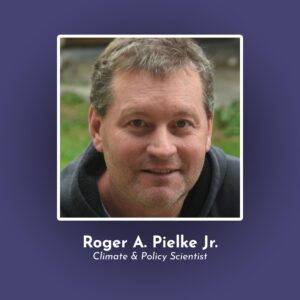
Show Summary
On this episode, Nate is joined by climate and policy scientist Roger Pielke Jr. to discuss the progression of climate research and modeling. The climate activist community is based around projections of what a future might look like given the actions of society – an important tool in the push for urgent climate action. Yet, just like with any other model, the assumptions and parameters can greatly shape the outcomes. How has climate science been shaped by previous models and public perception? How did 2Cº come to be our common climate goal post? Are we anticipating the future within the most likely range of possibilities, or are we polarizing ourselves to the extremes of climate denial and climate doom?
About Roger Pielke Jr.
Dr. Roger Pielke Jr. is a professor at the University of Colorado where he teaches environmental science and policy. A lifetime scholar with many interests, Roger researches and writes on subjects from understanding the politicization of science to decision making under uncertainty to policy education for scientists in areas such as climate change, disaster mitigation, and world trade. His most recent book, The Rightful Place of Science: Disasters and Climate Change takes a deeper look at the IPCC and climate science and how it is being interpreted in the media. Roger also oversees a popular Substack – The Honest Broker – where he is experimenting with a new approach to research, writing and public engagement. Roger holds degrees in mathematics, public policy and political science, all from the University of Colorado Boulder.
In French, we have a motto that says that a simple drawing is often better than a long explanation. Jean-Marc Jancovici Carbone 4 President
That’s very understandable because with left atmosphere thinking, one of the problems is that you see everything as a series of problems that must have solutions. Iain McGilchrist Neuroscientist and Philosopher
We can’t have hundreds and hundreds of real relationships that are healthy because that requires time and effort and full attention and awareness of being in real relationship and conversation with the other human. Nate Hagens Director of ISEOF
This is the crux of the whole problem. Individual parts of nature are more valuable than the biocomplexity of nature. Thomas Crowther Founder Restor
Show Notes & Links to Learn More
Download transcript00:00 – Roger Pielke Jr. works + info, The Honest Broker, A Primer on Implausible Climate Scenarios
01:47 – IPCC Climate Scenarios
02:01 – Available fossil fuel is over estimated, climate feedbacks are underestimated
06:10 – RCP Scenarios
08:07 – Climate forcing
09:25 – RCP Climate scenarios not evaluated for plausibility or probability
13:05 – Implausibility of RCP 8.5
13:43 – Biden Administration discarded RCP 8.5
15:37 – Uninhabitable Earth
17:15 – Bush administration narrative on Iraq War and effects on credibility
17:42 – Fear and motivation
19:10 – Difference in effects between global average degrees of warming
20:20 – Grand Forks flood
24:21 – Climate Anxiety
24:45 – Population Crisis
24:58 – One Child Policy, Forced Sterilizations
26:05 – Sensationalized studies are more likely to be published
26:35 – David Wallace-Wells, Greta Thunberg
29:35 – How did 2 degrees get decided as a target
31:25 – Frankly on Probability and Perception
37:21 – Deaths related to extreme weather events have dropped by 2-3 magnitudes
43:24 – Future population growth estimates
48:35 – WICKED problems
51:26 – Academic Tenure
55:18 – Walter Lippmann
57:34 – If only the US took perfect climate action, it would have minimal effects on the climate
58:30 – US polarization on climate
1:01:27 – Steve Rayner
1:03:05 – Lightbulb war
1:03:59 – Perfluorocarbons
1:06:45 – Emergent phenomenon
1:06:55 – Flood in Bangkok and car supply chain disruptions
1:10:03 – John Dewey
1:11:50 – Factfulness







